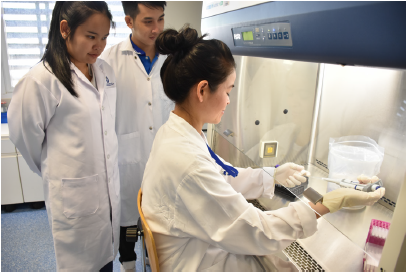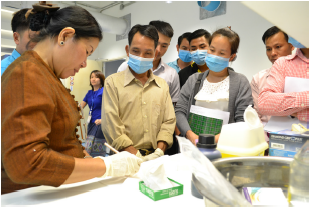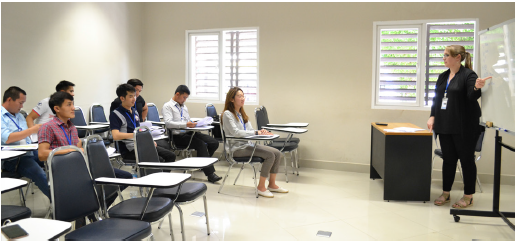COVID19 activities
 Project coordinators: Elodie CALVEZ (from January to
Project coordinators: Elodie CALVEZ (from January to
June) and Somphavanh SOMLOR (since June)
Staffs: Thonglakhone XAYBOUNSOU, Phaithong
BOUNMANY, Sitsana KEOSENHOM,
Souksakhone VIENGPHOUTHONG, Somsanith
CHONEPHETSARATH
Military staff: Kitphithak FANGKHAM
Trainees: Oudone VONGSANTI (Military), Kedkeo
INTAVONG and Longthor VACHOUAXIONG
(USAID)
Severe acute respiratory syndrome coronavirus 2 (SARSCoV2) has emerged at the end of 2019 in the city of Wuhan, China. Since then, this highly pathogenic and transmissible virus has spread massively all over the world. SARS-CoV2 is responsible for the Coronavirus disease 19 (COVID19) pandemic. As of the beginning of November 2020, more than 47 million cases of COVID19 and more than 1.2 million deaths have been reported worldwide.
The early notification of the first SARS-CoV2 cases in neighboring countries urged the implementation of diagnostic tools in the Lao PDR. As soon as January 2020, the A&EVD laboratory set-up two different protocols (the Berlin and Hong Kong protocols) based on the molecular detection of the viral genome by RT-qPCR. In this context, IPL has been solicited by the Ministry of Health (MOH) as a front-line laboratory for COVID19 diagnostics and has been assigned a surveillance network of 10 hospitals from North to South: three civilian hospitals in the Vientiane Capital (Setthathirat, Lao – ASEAN and Children’s Hospital) and seven military hospitals from Phongsaly, Oudomxay, Vang Vieng (Vientiane Province), Xiengkhuang, Luangprabang, Savannakhet, Champassak provinces.
On the 2nd of March 2020, A&EVD started its diagnostic activity routinely. At the beginning of April, the protocol was updated and only one of the two techniques implemented was kept according to the WHO guidelines (Berlin protocol). Samples are received daily from the hospital network. Since mid-September, the A&EVD team has also been in charge of collecting samples from passengers of the World Food Programme flight at the Wattay International Airport. Results are reported within 24 hours to the Lao Ministry of Health – International Heath Regulations contact person, who then transmits the results to the clinicians/patients and to the World Health Organization. By the end of October, 558 samples were tested by the team. A first viral sequence has been obtained in May from an asymptomatic patient of 21 years from Vientiane locally-infected, whose index case was a traveler from Thailand.
In the framework of this activity, the A&EVD team has been reinforced by lab members of the other IPL teams. It has been technically assisted by members of the Institut Pasteur du Cambodge and Paris. In addition, the Institut Pasteur du Laos has been financially supported by the Agence Française de Développement through Ecomore-Covid funding. IPL was supported by donations from governments of various countries: France, Luxembourg, the USA, Japan, Canada and also individuals via direct donations or donations to the Foundation Institut Pasteur du Laos under the auspices of the Fondation de France.
Beginning of October, the United States Agency for International Development, USAID, has granted to the A&EVD lab a one-year program in the framework of the COVID19 threat. This program aims at increasing the capacity of the COVID19 diagnostics in Lao PDR through an increase of samples tested and the genetic analysis of the circulating viral strains by sequencing as well as capacity building through training of laboratory technicians dedicated to COVID19 diagnostics. This grant will significantly increase the impact of IPL on the diagnostics of COVID19 in Lao PDR.
Besides these public health activities, the A&EVD team, in collaboration with the Medical Entomology & Biology of Disease Vectors lab, is also conducting a research program on tracking the origin and transmission/ spillover of SARS-CoV-2 in the wild fauna of Lao PDR.
Training activities
• From Oct. 2019 to June 2020, supervision of two master students of the Lao Tropical and Public Health Institute. The two students studied the seroprevalence of dengue and Japanese encephalitis viruses in the Vientiane Capital, respectively.
• From mid-Oct. 2020, supervision of two laboratory technicians of the University of Health Science and of the Faculty of Medical Technology. Their training focused on COVID19 diagnostics and is funded by the USAID grant.
• From July 2020, a military laboratory technician from the Institute of Disease Prevention of the Lao Army joined the team and participated in the arbovirus and COVID19 diagnostic activities.

Education activities (Elodie Calvez)
• Arboshield program: 8 participants divided into two groups (one group per year) from the Lao Army Institute of Preventive Medicine. In this course, six topics were described: Biosafety and biosecurity, concentration and dilution, general biology, molecular biology, immunology, pathogen vector transmission. This training is organized into sessions of one to two hours per week since 2018.
• IPL staff training: Every week, IPL staff, divided into two groups of 10 to 15 people, participated in a one-hour lecture on different topics such as concentration and dilution, general biology, molecular biology, or sequence analysis.
• Journal club organization: Every two weeks, a journal club is organized with the IPL junior scientists. The aim of the journal club is to strengthen the ability of the junior scientists to select a publication, read it critically

Evaluation of new diagnostic tools for Chikungunya virus
Surveillance activities performed by the A&EVD laboratory over the years have generated a collection of nearly 15 000 human samples. The ethical agreements and the patient informed consent allowed the lab to use the leftovers for research and to participate in the development of new diagnostic tools for arboviral infections. In 2020, the lab has been solicited by private companies to perform evaluation studies of automated serological tests for the chikungunya virus. These requests acknowledge the expertise of the lab and of its staff and offer a new source of income to support IPL activities.
Publications
1. Calvez E, Pommelet V, Somlor S, Pompon J., Viengphouthong S, Bounmany P, Chindavong TA, Xaybounsou T, Prasaysith P, Keosenhom S, Brey PT, Telle O, Choisy M, Marcombe S, Grandadam M. Trends of the dengue serotype-4 circulation with epidemiological, phylogenetic, and entomological insights in Laos between 2015 and 2019. Pathogens. 2020 Sep 3;9(9):728. doi: 10.3390/pathogens9090728.
2. Calvez E, Somlor S, Viengphouthong S, Balière C, Bounmany P, Keosenhom S, Caro V, Grandadam M. Rapid genotyping protocol to improve dengue virus serotype 2 survey in Lao PDR. PLoS One. 2020 Aug 7;15(8):e0237384. doi: 10.1371/journal.pone.0237384.
3. Miot EF, Calvez E, Aubry F, Dabo S, Grandadam M, Marcombe S, Oke C, Logan JG, Brey PT, Lambrechts L. Potential of the sylvatic mosquito Aedes malayensis to act as an arbovirus bridge vector in a forested area of the Nakai district, Laos. Scientific Report. 2020 May 8;10(1):7750. doi: 10.1038/s41598-020-64696-9.
4. Nouanthong P, Hübschen JM, Billamay S, Mongkhoune S, Vilivong K, Khounvisith V, Sinner R, Grandadam M, Phonekeo D, Black AP, Muller CP. Varicella zoster and fever rash surveillance in Lao People’s Democratic Republic. BMC Infect Dis. 2019 May 8;19(1):392. doi: 10.1186/s12879-019-3990-7.